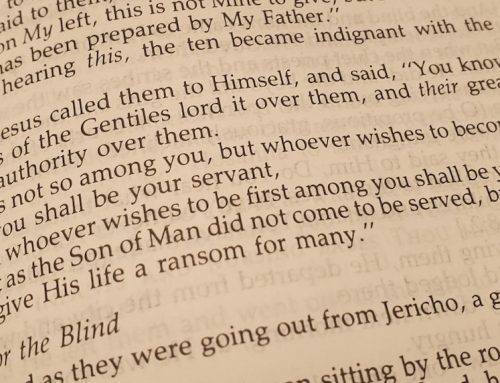I’m trying hard not to be unfair or nitpicky with this headline and my comments on TC’s talk at the 2019 March Week on unity. While he pushes hard for the suppression of negative information using the tried and true “fear and intimidation” tactic of the threat of withdrawal, which I find very problematic, he does seem to rightly understand the subject of gossip. On that, I completely agree with him. Believers should NOT be promulgating gossip, and I commend him on that instinct.
However, the problem is that Stanton long ago lost the moral clarity to distinguish between destructive gossip and honest dissent. When you suffer generations of oppressive teachings and practices, you become desensitized to this distinction, like generations of Chinese and North Korean victims of government of oppression.
To the Stanton “rabbis,” any criticism at all of “The Church” is worthy of circling the wagons and firing arrows back at the church’s so-called “enemies” and “adversaries.” And the people who have been conditioned to submit to such attacks against conscience draw back in fear.
But we don’t see this kind of reactionary attitude in the New Testament church. When we’re told about the Grecian widows “murmuring,” in Acts 6, it was actually a constructive thing that ended up bringing about needed reforms. It turned out the Greek widows actually were being neglected; so deacons were appointed to oversee that ministry and bring some needed management to it. Problem solved.
So I don’t think Stanton has a biblical view of so-called “murmuring” at all. To them, murmuring is any criticism of the ruling elite class of teachers, preachers, and evangelists—whom I call the “rabbis,” as in Jesus’s day. But that is not the Biblical definition of murmuring.
In this talk, TC doesn’t even advocate for basic honesty and transparency about Stanton’s faults. Instead, it’s all about controlling the narrative. But shouldn’t the church be confessing their faults one to another so that they can pray one for another? That would be true transparency. That would be true honesty.
Instead, their top-down approach is aimed at covering up any and all negative information—unless, of course, it’s being used by a “rabbi” to bludgeon a member into submission. This lack of moral clarity has led to nothing more than whitewashed sepulchres. They’re making the outside of the tomb look beautiful, while inside are full of dead men’s bones.
Matthew 23:27-28 – “Woe to you, teachers of the law and Pharisees, you hypocrites! You are like whitewashed tombs, which look beautiful on the outside but on the inside are full of the bones of the dead and everything unclean. 28 In the same way, on the outside you appear to people as righteous but on the inside you are full of hypocrisy and wickedness.”
I can’t help but think of political scandals. When a corrupt administration has a leak, they always do the same thing—bring the hammer down on leakers, suppress more information, and spin the press to whitewash it all. Why not just make the hard changes so there’s nothing negative to leak? Wouldn’t that be easier? In fact, Jesus says exactly that just a couple of verses before the above passage:
Matthew 23: 25-26 – “Woe to you, teachers of the law and Pharisees, you hypocrites! You clean the outside of the cup and dish, but inside they are full of greed and self-indulgence. 26 Blind Pharisee! First clean the inside of the cup and dish, and then the outside also will be clean.
Church transparency is a Biblical concept. The things the first century church did “were not done in a corner,” and they turned the world they lived in upside down. So this article is not written from the perspective of an “enemy” or “adversary” of Stanton (No, you can keep telling yourself that, but that’s not what I am). Instead, this article is from the perspective of a reformer. An advocate for truth. Truth, after all, doesn’t need to be afraid of a lie, and I have put my thoughts out here openly for all to see and criticize. Can you say the same?
This blog simply provides honest critiques that Stanton should—but apparently, doesn’t—want to evaluate in light of scripture. We have some disagreements, to be sure, but this blog is literally the only venue anyone has for talking these things out and gaining a more Biblical worldview without fear of punishment. Because if honest questions were asked openly of Stanton’s “rabbis,” we all know how that would be responded to. You’ve told us as much in this talk: one warning perhaps at most, then withdrawal to “send a message.” I don’t know, but that sounds kind of like lording things over the flock.
Instead, it seems to me that our instincts ought not to be to cover up problems in the church, or brush things under the carpet. We shouldn’t be trying to take a bucket of bleach to the sepulchre just to shine it up for “the babes” or teens. The church says these impressionable people shouldn’t hear any negative facts (whether true or not) about the church, or ever hear that some people might consider the church to be a cult. But does truth need to be afraid of a lie? Why not be honest? First century critics of the followers of Jesus called the church a cult, and the church didn’t cover it up or suppress it. They answered it, boldly, at great risk of life and limb, and even in open court before King Herod, no less.
I’m passionate about Christian apologetics, and I believe one of the biggest failings of the American church has been to whitewash modern Christianity and pretend everything is just fine—all the while, our teens go off to college to be indoctrinated by a leftist, atheist professor. That’s because they are not being equipped with the truth of Christianity, and rebuttals to the lies about it. And you can’t be equipped if you believe the lie that the church is perfect.
According to this talk, being honest about unsavory doctrines, faults, or controversies surrounding the church would just be shooting the church in the foot. I disagree. Until you admit you have these problems and confess them humbly and publicly, you’ll never truly solve them. But that’s just me.
References
Below are some of the more interesting comments excerpted from TC’s talk, but feel free to listen to the entire thing so you know I’m not taking anything out of context.
“The things again that happen right there that are being reproved, or maybe disciplines that take place in that church. KEEP IT THERE! That’s another gate that is getting into, causing division in the brotherhood. And it is prolific!
“What we have going on right now is that whatever is happening in some of these churches—and maybe perhaps there are some disciplines that have taken place, where people are sitting down, and they don’t agree with it; guess what happens? They turn around and call their brother in Colorado Springs and they turn around and they call their sister in Atlanta, [and etc.]. And it’s like, you can’t believe what this is doing to the churches. It’s unbelievable. It’s causing so much chaos. So much consternation. So much confusion. Boom. Author. Author of confusion.”
“It’s like, back in the old days, it’s like, you know, look…you keep those things there.”
“And so whether it’s young teenagers that are texting about somebody’s withdrawal in your congregation clear across the country. There’s not a whole lot I can do as an evangelist, OK? Of course, hopefully the parental issue will take care of that, which I think it should. Teaching, and things like that are important. And I know that we’re not going to be able catch everything going out there, right? They’re going to do that.
“And you think, that’s just teenagers, that’s just kids. I can’t tell you how much damage children have caused in the church. Years ago, we didn’t have this problem. Communication has caused that problem. I won’t even call it communication, I’ll call it texting. Texting, or networking of any kind, social networking, that sort of thing. You know?”
“I want every one of my babes to believe the church is, like, ‘there ain’t nothing wrong with it.’ I don’t want them thinking things! That’s shooting myself in the foot.”
“I mean, sometimes, children will text things and so forth, and they’ll put it on the Internet, and you have the church’s adversaries which are mining things, you know, in the brotherhood, about the church, so they can write it in their blog. Now, I don’t think anybody here would ever do that, and I don’t think anybody that are Christians in your congregation would do that. But when you start putting things out on the Internet, and this and that, just remember…fool’s names and fool’s faces often appear in public places. Because you can never go and scrub it off the wall. It’s there for life. Whatever you put down there, it’s going to remain for life.”
…
“Be careful how much again that you spread it out here. Certainly remembering that there are consequences, and there are consequences to murmuring. And I know that it may take a few withdrawals before people start to understand, we’re serious!
“You do that again in another congregation, you’re gonna be withdrawn from. And as soon as that starts getting around, that may be the way that we stop them. I don’t want to stop them that way. But we may want to think about it.
“Because if we’re a little soft about it, because they’re young, or this thing or that thing, you give them a warning, and say that’s the last time. We’re stopping this. It’s too important.”
Note: This last section is exactly the kind of oppressive behavior that sparked one of the first articles I ever wrote for this blog about the church’s fear and intimidation tactics. If you make the church look bad, they will make an example of you, as the above shows.
I’m blessed that I’m unreachable, as my kids are not in the cult. My prayers are for those of you who don’t have that advantage. Whether it’s your son, daughter, mom, dad, spouse, or sibling still in the cult, those family connections are the only route they have to manipulate you into being quiet. Don’t let them do it. Keep speaking truth in love. Be wise as serpents, and harmless as doves.
See also: Should I use the word “cult?”







Question: Is anyone having any trouble posting comments—either anonymously or otherwise? Just want to make sure.
How do you post anonymously again?
There are two ways. 1) Create an account with a username (pen name) and password. Then you log in and control your pen name. Note that I’ll have access to see your email address if you go this route, unless you register with a fake email address. 2) Or, don’t log in (or log out, if necessary), then just click to post a comment. Enter a pen name in the “Name” field, and an email (a fake email is fine if you want to stay anonymous even to me). Note that if you have registered in the past with a… Read more »
Kevin, when I last posted I used my real name, but it posted as ExMeriegroupie instead! 🙂
See above. You can solve this problem by logging in (reset your password if necessary), and change your nickname ExMerieGroup to your real name.